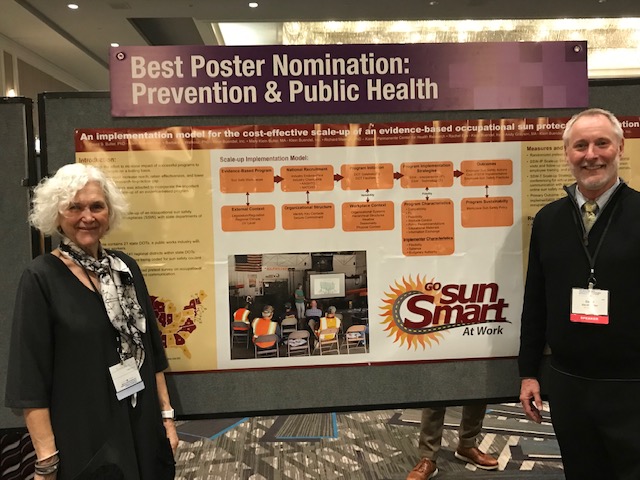
An Implementation Model for the Cost-effective Scale-up of the Sun Safe Workplaces Program
Dr. David Buller and Dr. Barbara Walkosz from Klein Buendel presented a poster on a new implementation model for the cost-effective scale-up of an occupational sun protection program at the 12th Annual Conference on the Science of Dissemination and Implementation in Health in Washington, DC, December 4-6, 2019. The poster was nominated for Best Poster from the Prevention and Public Health Division.
Scale-up is the effort to increase the impact of successful programs to benefit more people on a lasting basis. Scale-up efforts must increase reach, retain effectiveness, and lower costs to provide greater access to benefits and close the research-to-practice gap between effective programs and real-world application. This project is studying the nationwide scale-up of an occupational sun safety intervention, Sun Safe Workplaces, with state Departments of Transportation (DOTs), a public works sector with thousands of outdoor workers.
Costs of national distribution can be daunting and influence intervention intensity and program effectiveness. Identifying cost-effective scale-up strategies is essential for moving research into practice. The new framework draws upon existing implementation models, including those developed for occupational health and safety, and operationalizes implementation for scale-up within RE-AIM. The RE-AIM framework was adapted for this new framework by incorporating cost as a primary factor.
In a randomized trial, Sun Safe Workplaces (SSW) is assessing implementation rate and costs associated with two methods of scaling-up SSW. The original intervention depended on personal visits with managers, materials promoting sun protection policies and education, in-person sun safety training for employee groups, and on-going follow-up communication with managers supporting sun safety (SSW-IP), a resource-intensive form of intervention. Now SSW-IP is being contrasted to a scale-up strategy that uses web-based and telephone conferencing, responsive training platforms, and electronic resources for virtual contacts and training (SSW-T). Technology-based programs have the potential to deliver standardized, engaging content and increase portability while decreasing cost of delivery to enable reaching more employers when scaled-up to nationwide distribution. Districts within DOTs are randomized to one of the two scale-up methods. The SSW-IP and SSW-T interventions are being delivered in 21 state DOTs with 141 districts.
This research is funded by a grant from the National Cancer Institute (CA134705; Dr. David Buller and Dr. Barbara Walkosz, Multiple Principal Investigators). Additional poster coauthors include Dr. Richard Meenan from the Kaiser Permanente Center for Health Research; and Mary Buller, Rachel Eye, Andrew Grayson, and Savanna Olivas from Klein Buendel.
